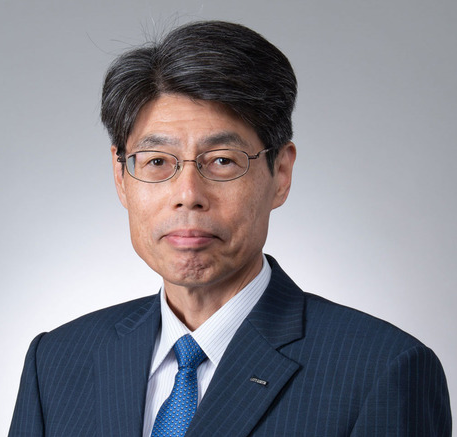Dr. Tsuyoshi Kitani, President and CEO of NTT DATA INTELLILINK Corp., talks to Gernot Kapteina, Founder of OYSTEC, about the fascination of technology, and the balancing act as a leader both to drive innovation as well as to manage organizations.
Kitani-san, thank you very much for the opportunity to do this interview with you! You are a Japanese executive with a brilliant background in technology: you have always been interested in innovation, held a very high position at NTT DATA Corp. and are currently President and CEO of NTT DATA INTELLILINK. Can I start by asking you why you have always been particularly interested in technology?
Kitani-san: Thank you for giving me the opportunity to talk about my background. I have to look back to my time in university to explain my interest in new technologies. I had a great computer science lecture class with Professor Aiiso, who made a tremendous contribution to computers in the early days of the University of Illinois. Inspired by his lectures, I wanted to understand more about computers. With that goal in mind, I began my career at NTT Research Laboratory in 1983.
This is also reflected in your studies at Keio University in Tokyo as well as Carnegie Mellon University in the USA. Why have you chosen each of these universities, and what subjects have you studied there?
Kitani-san: Keio is one of the most prestigious universities in Japan. I was fortunate to be enrolled at the university about forty-three years ago. Originally from a countryside area near Hiroshima, I never thought of living in Tokyo and Yokohama. Then, at NTT Research Labs, I did research in the field of natural language processing, or rather called NLP, for five years. When NTT DATA was spun off from NTT in 1988, employees from two lab units, including me, transferred to NTT DATA.
After the transfer, I felt strongly that I needed to study more mathematics and computer science to achieve better research results. I decided to leave the company to study at a university in the U.S. or Canada where good computer science courses were offered. I was fortunate that Mr. Yamashita, who later became President and CEO of NTT DATA, gave me the opportunity to study at any university I wanted, with the full support of the company. I chose Carnegie Mellon University with its well-known research institute, the Center for Machine Translation. I was a visiting researcher there for two years and participated in a DARPA competition project that required NLP technology.
What technical topics, also besides NLP, have you been particularly interested in, both during your studies and throughout your lifetime? Can you tell us something about your published scientific work on some of the topics that are important to you?
Kitani-san: In 1991-1993, when I was at CMU, NLP was one of the AI technologies. However, computing power was limited and the technology was still in its infancy. At that time, rule-based pattern matching was the dominant technology. Nevertheless, it usually worked well for narrow business domains. In the project I participated in at CMU, we extracted useful information from newspaper articles from corporate joint ventures and the semiconductor industry. I published a few conference and journal papers describing the technology used and the results of the projects. When Deep Learning gained prominence about ten years ago, NLP and AI in general were in the winter months. Now we are witnessing incredible achievements, at least it seems to me, in speech recognition, machine translation, and other areas.
In preparing for our interview, you said that you always wanted to be more of a researcher but were seen by management as having more of a leadership role. You were nevertheless able to combine both roles. Was that the case from the beginning, after you joined NTT from university?
Kitani-san: When I received the request from NTT DATA to go back to Japan, I thought that I could continue to work at CMU as a researcher. However, the difference between the skills of the research faculty, including the PhD students, and me was obvious. Simply put, they were just too smart. Recognizing this difference and feeling committed to NTT DATA, I decided to go back to Tokyo. I continued to do research at the R&D headquarters in Tokyo while supporting NTT DATA's business units. I felt comfortable with the combination of research and business support and managed a sizeable NLP group.
You were responsible for the NLP group. But then you went to the USA again, but this time as the Head of Technology Center of California. How exactly did that happen, and what was your company role in the U.S.?
Kitani-san: Yes. The decision was made quite suddenly due to the unplanned transfer of my predecessor. On a Thursday morning, I was told that I was to transfer to the technology center in California, and the following Monday I was in the California office to take over the duties. The center was located in the heart of Silicon Valley and was to support the technology assessment and business alliance for NTT DATA.
Because of this assignment, I did not have the opportunity to do research myself, but focused on managing the center, which was incorporated as NTT DATA AgileNet, LLC in 2001. During my time there from 1999 to 2002, I learned about a variety of technologies from start-ups and established technology vendors. I also witnessed the ups and downs of the start-up business during the .com bubble and burst. Most importantly, I have worked with some of the brightest minds from NTT DATA's technology department who are leading technology innovation at NTT DATA today.
You later returned to Japan, and became Executive Vice President & Director, Head of Technology and Innovation General Headquarters. What were your tasks and responsibilities and which milestones do you have fond memories of?
Kitani-san: After I returned to Japan, I held several positions in NTT DATA's technology department and became the Head of the Technology and Innovation General Headquarters (TIG). There were about 1,000 engineers and scientists in the organization, and my main task was to provide technological support to NTT DATA Japan. Another important task was to evaluate new technologies and promote the spirit of innovation at NTT DATA.
To this end, I launched an innovation acceleration program and created Centers of Excellence in certain technology areas such as digital design, AI, and blockchain. In implementing technology innovation, I collaborated with many NTT DATA employees around the world, including you, Gernot, which is still one of my strengths today.
You were nominated President and CEO of NTT DATA INTELLILINK two years ago. Can you tell us something about your current company and your mission?
Kitani-san: NTT DATA INTELLILINK provides technology services mainly for NTT DATA Japan. We focus on IT platforms, software platforms, and cybersecurity. With approximately 1500 employees, including our group company, we provide hardware resale and maintenance services, professional services, and our IP-related services. We have grown over the past 23 years since our founding thanks to the growth of NTT DATA's business. Our current revenue is approximately 60 billion Yen, or USD 450 million. In addition to business growth, we are in the process of reforming ourselves to become more technologically savvy and innovative, and shifting more toward services that leverage our own technological resources.
The way I see NTT DATA comparing globally with competitors, we need to share our knowledge globally across business units to do business better and faster. INTELLILINK is working with its headquarters to promote knowledge sharing in Japan, and is prepared to do the same globally. NLP technology can create summaries of documents and translate them into other languages to quickly understand the content and sometimes hide confidential information. We will also need large-scale yet optimized offshore delivery, which is critical to the growth of the business as everyone fights for talent.
INTELLILINK provides digital technology services to the EMEA region with NTT DATA GDS Pune and start-ups in India on a small scale. I believe that in the future, all NTT DATA's offshore centers should join together and work as a cost center for all operating companies.
In the course of our conversation, you strongly emphasized your affinity for technology, mentioning areas like NLP. Now I would like to ask you: Which future technologies do you see as relevant for business and society?
Kitani-san: Supporting humans through automation is becoming increasingly important to increase people' productivity, comfort and safety. Artificial intelligence is the core technology for realizing automation with underlying breakthrough technologies such as quantum computing. My lifelong interest is in NLP and the life sciences. I remember a book called "The Language of Life: DNA and the Revolution in Personalized Medicine" by Francis Collins intrigued me a few years ago.
This definitely sounds like a must-read. Now, besides your profession in business and your interests in technology, what else plays an important role in your life?
Kitani-san: I spend more time with my family now than when I was at NTT DATA HQ. That's partly because I can work from home a few days a week because of the pandemic. I jog about 100 km a month and play baseball with NTT DATA colleagues once a month. NTT DATA INTELLILINK created our employees’ baseball club just a few weeks ago, and I'm one of the club’s managers.
These are compelling areas of interest. Now allow me the following final question of our interview: Where do you see yourself in the future, after your role as President and CEO of NTT DATA INTELLILINK?
Kitani-san: I want to support NTT DATA in any way I can when asked, being careful not to disturb the next leaders. I also want to help people out there who really need support. Although we maintain a high level of quality and services in many industries, I feel that Japan is changing rapidly. The majority of people belonged to the middle class, which was true for a long time, but nowadays, with a shrinking population, an aging society, low wages, a huge amount of government debt, and insufficient investment in science, Japan has become weaker in many ways. Since people in my age group had the best time in Japan after World War II, I feel that I need to give it back to the younger generation. I could teach them math or computers or whatever I can do for them. And I'm happy to help older people who are behind in digital technology. I'm pretty sure I'll have a lot to do after I leave NTT DATA.
These are inspiring reflections. Kitani-san, thank you very much for this interesting interview!
Link: NTT DATA INTELLILINK Website
Link: The book The Language of Life: DNA and the Revolution in Personalized Medicine
Copyright: The Carnegie Mellon University (CMU), The University of Illinois, The Keio University in Tokyo, NTT, NTT DATA, NTT DATA INTELLILINK, NTT DATA AgileNet, and other company names and products mentioned are registered trademarks of the respective companies.

